5 Ways Every Movie Misunderstands Guns
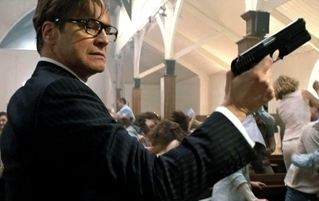
Despite a massive drop in gun violence, spree shootings are such the American craze that VH1's inevitable I Love The 2010s will be nothing but ten episodes of George Takei weeping. And thanks to the Internet, the debate is almost as exhausting as the sorrow. The loudest voices tend to pin blame on a single problem, like gun control or mental health, while groups like the NRA eject responsibility more forcibly than a Chipotle-filled bowel. No one wants to admit that their side might contribute to what is clearly a broad cultural problem. And that can't be more evident than when looking at cinema and the really fucking weird choices filmmakers keep making when it comes to guns.
Movies may not cause people to suddenly become maniacs, but that doesn't mean that Hollywood doesn't have a pants-poopingly bizarre, almost dangerously naive view of how gun violence works. Starting with the fact that ...
There's No Such Thing As "Realistic Gun Violence" In Films

We're not knuckleheads. Any functioning adult is well aware that movie violence isn't any more realistic than movie sex, drug use, police procedure, or dinosaur DNA accessibility. No one picks up a gun and expects it to have an endless supply of screaming Rambo bullets, the same way no one thinks movie guns show anything resembling the real trauma they cause. Unless, of course, it's something like Saving Private Ryan, which portrayed D-Day as Hell's wailing beach party.
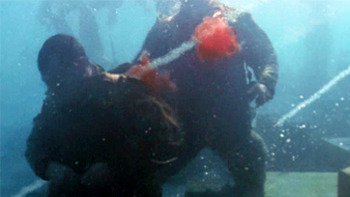
Only here's the thing: That shot of WWII bullets whizzing dangerously through ocean water is a terrifying lie, because every real-world test of this scenario results in the bullets breaking apart or slowing down just a few feet after hitting water.
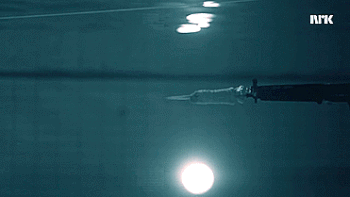
The only way to kill someone would be at point blank -- meaning that this scene from a war drama renowned for its harrowing realism is less accurate than the final underwater fight in Lethal Weapon 4 (a movie which features a laughing gas sequence).
The act of sandwiching kooky horseshit with stark reality happens way more than we'd like to realize. Collateral gave Tom Cruise expert technique in taking down two guys in an alleyway before conducting a ridiculous John Wick-style nightclub shootout a few scenes later. The Way Of The Gun consulted with a Navy SEAL to portray realistic room-clearing tactics before having the characters walk off limb-destroying gunshot wounds. The Bourne Identity is known for its grounded depiction of CIA operations -- which apparently involve bullseyeing guys while air-surfing a corpse Legolas-style.
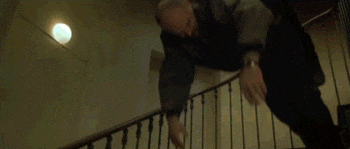
He then gives the corpse back to the kid he stole it from, as Biff eats manure.
This macabre clowny moment, by the way, is brought to you by the alphanumeric PG-13 -- a rating that in the last 30 years has grown to contain more scenes of gun violence than its "adult" R successor. That's right: PG-13 makes up for not having all that awful sex and bad words with an obscene hell-swarm of lead deposits. Movies like the new Robocop, the Men In Black series, Terminator Genisys, Transformers, and Mission Impossible can kill as many people they want ... if we don't see any blood or pesky consequences to the violence. And so, for some backward-as-fuck reason, Agents Jay and Kay can blow an unarmed guy's head off, shoot up a restaurant full of people, and bash someone's head in, and it's family fun as long as cartoony alien blood squirts out at the end.
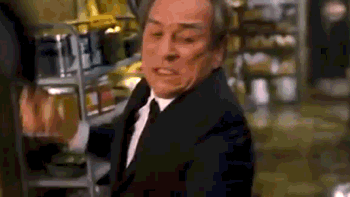
And somehow, I've only just begun to tell you how howling bananas the Men In Black films are ...
Insane Gun Hoarders Always Save The Day In Movies

There's a scene in Men In Black II in which the wisecracking agents swing by Kay's old apartment, and the residing family gawks on as a false wall opens to reveal a giant armory of Tim-Burton-esque weapons.
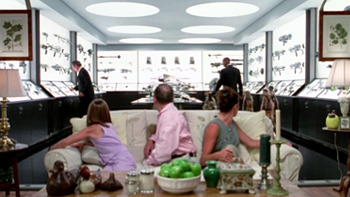
While this saves the day for our heroes, when you think about it, stocking a hundred guns in your home is a really fucking crazy and paranoid thing to do. No matter how you feel about firearms, if a friend or family member led you into a basement wallpapered with assault rifles and body armor, you'd immediately feel uncomfortable about that person. Because unlike in the movies, an army of robots from the future probably isn't going to suddenly show up and make that shit useful.
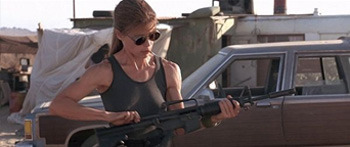
In any other universe, Sarah Connor is a maniac with a desert gun cache and not the world's savior. Same goes for the gun-hoarding Gummer family in Tremors, who by staggering chance needed their weapons to fight giant mole slugs instead of an inevitable ATF raid.
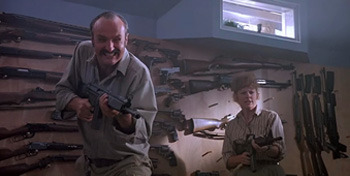
See, in a universe of zombies and monsters, it's not only acceptable but necessary to have a Walking Dead-style armory. So any time we see a gun fanatic overdoing their collection, like in Kick-Ass, RED, or Hot Fuzz, the accidental lesson is that they were totally right to do it. Meanwhile, real-world gun hoarding tends to look like this ...
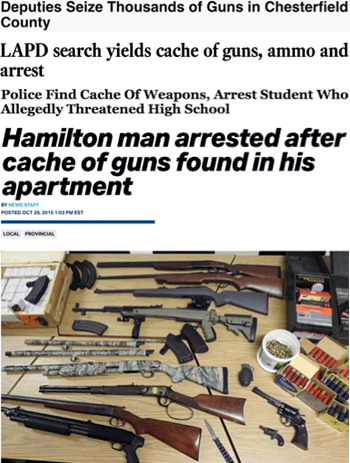
... because there's no real-world reason to stockpile guns unless you're planning a fucking ground war or paranoid stronghold. The (extremely awesome) movie Krampus puts the issue front and center when the main character gets upset at his brother-in-law for bringing several guns to their suburban house on Christmas. But when the group is left battling Anti-Santa's minion army of demonic toys, suddenly the anti-firearm hero is gratefully wielding a gun and flashlight like he's Agent Mulder.
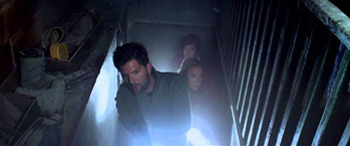
Take that, anti-gun activists! Sure, you cry about firearms now, but just you wait until those Bavarian lore-beasts come knocking! Again, in any other world, bringing a shotgun and pistol to a holiday gathering is kind of nuts, and would likely result in the brother-in-law shooting a black 13-year-old caroler before getting off in court and becoming a Twitter celebrity. Thank goodness the real-life gun community isn't encouraging these fantasy hero scenarios, right? Please tell me I'm right.
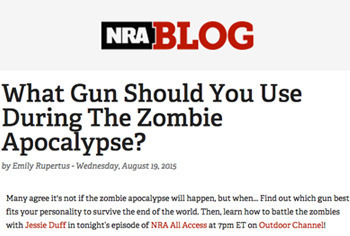
Fuck.
People Trained To Hold Guns Are No Longer The Heroes In Films

Weird question, but remember when cops were portrayed as the good guys in films? The first Die Hard is not only about a hero cop, but features other cops trying to do good while under the command of pencil-pushing FBI Johnsons. Even Sergeant Al "I Shot A Kid" Powell finds redemption by saving Bruce Willis and regaining the courage to fire his weapon. His entire arc was about learning to kill people again after shooting a child.
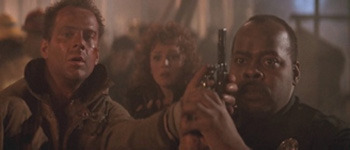
For the first three films, police are more than background dupes or corrupt assholes. They even get hero moments, like when they defuse the breakfast bomb in With A Vengeance. But here in the superhero era, the Die Hard series focuses more and more on the premise of one man going it alone while the authorities either watch helplessly or blindly attack him.
Seriously, modern films and television don't want us to trust the police or military anymore. Fear The Walking Dead portrays the army as ineffective and creepy, the police in John Wick purposefully avoid conflict, and The Equalizer and other vigilante films make them snickering and corrupt. One of the hero moments from Dark Knight Rises comes when Blake Robin Levitt decides to quit the force and go it alone. And so the man trained to responsibly handle firearms disgustedly tosses one on the street. He chucks it like a dead rat for any child to put in their mouth.
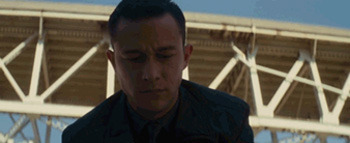
See, reckless vigilantism is totally in, you guys. It's sexy and unbridled, like the Oscar Isaac of trigger discipline. Heroes like Iron Man soar above the military, while Daredevil fights in the dark crevices of police misconduct. Even the new Godzilla portrays the giant city-destroying monster as a savior while the guys in camo do next to nothing. Compare that with the (albeit terrible) 1998 film, where the monster is defeated by the army. Because these days, we want a hero who gets the job done, even if it means Hulk-smashing a building or stealing cars or torturing someone. After all, there's nothing worse than losing, right?
And that leads us to the weirdest trend yet ...
In Movies, Being A Victim Is Worse Than Being The Villain

On the subject of Batman: If you could be any character in The Dark Knight series besides the Dark Knight himself, who would you be? I'll wait for you to think it over.
...
Did you answer the Joker? I sure did. Heath Ledger's Joker was both sinister and charismatic, and he might be the coolest character in the whole series. Just ask this guy:
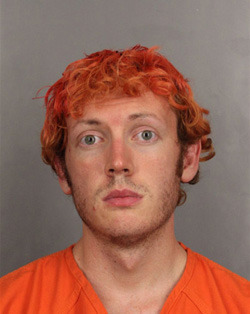
Oh, right. That creep-faced ginger-wannabe Aurora shooter made direct comparisons between himself and the Joker. And while that in no way means that The Dark Knight caused him to kill a bunch of people, almost every film contributes to the twisted idea that it's better to be a cool villain than a dorky victim.
Hell, a victim is pretty much the worst thing a main character can be -- which is why any time they become one, we get a two-hour revenge story in which they mow down a small army to prove how tough they are. After John Wick's dog is killed, he murders 77 fucking people as retaliation. I love this film and that dog was adorable, but shouldn't the heroes be the people who don't go on a public killing spree due to the loss of a pet? The ones who learn to move on in peace? But nope, movies tell us that cowardice is when a person refuses to act, no matter how stupid the situation. Just ask these guys:

This isn't a new phenomenon, as action films like Death Wish have always been power fantasies for scared middle-aged men. We love the fictional story of an "average Joe" refusing to lie down and taking the law into their own hands, but seem to forget how amazingly wrong that scenario plays out in the real world.

Saying the "good guy with a gun" argument is bullshit isn't anti-gun, by the way. Any responsible gun owner with a concealed carry permit knows that part of having a gun is not trying to be a Michael Bay character when shit gets real. Without the proper training, trying to get the jump on an active shooter is like pulling out a Hail Mary pistol when you're a '90s action villain: It only ends one way.
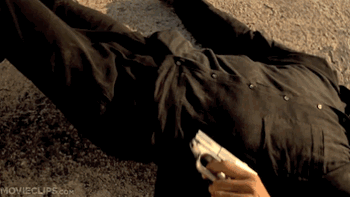
Remember when all '90s villains did that? It was a handy way to deliver the dead villain money shot without making the good guys look like executioners. And whether or not filmmakers knew it at the time, this subliminally taught an entire generation that it's better to murder someone in cold blood than to show compassion and risk being wrong. Now, whenever a fictional person refuses to kill or hides from danger, we automatically hate their guts. Look no further than every fan-despised character on The Walking Dead.

So we've hit a point where it's better for the hero to walk into a place guns blazing than attempt a moral solution. And that means ...
In Movies, Spree Shootings Totally Solve All The Heroes' Problems

The first Matrix became somewhat controversial when Neo tore up a lobby of guardsless than a month before two heavily-armed buddies killed 13 people at Columbine High School. While everyone made the obvious trench-coated connection, it was generally decided that blaming films and video games was reserved for the aged and out-of-touch. But since spree killings have now become more frequent and publicized, it stands to reason that Hollywood would avoid drawing any more parallels. Surely, gone are the days where Keanu Reeves could execute a bunch of ravers in a nightcl-- ohhhhhhhhhhhhh wait.
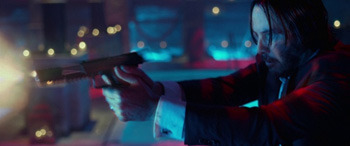
No. No, we still do that, don't we? And the act of heroically bullet-razing a public place is a time-honored tradition in action films. Remember this scene?
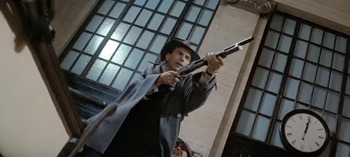
The Untouchables is most known for a baby-endangering stairway shootout that was set up by the good guys as a means to an end. Because unlike the boring real-life version of Eliot Ness's pursuits, movie problems are actually solved by dramatic bloodbaths. If the Bride needs to confront her enemy in Kill Bill, she does it with a dance club massacre. If the Boondock Saints want to get the bad guy, they execute him in the middle of a courtroom. In other words, walking into a public place and killing people sure gets things done in films.
Of course, in all these examples, the ones getting got are undoubtedly bad guys, right? When Colin Firth shoots up the Westboro Baptist Church in Kingsman, we all pump our fists at the stylish brutality because the hero is murdering assholes. Same goes for when John Wick shoots up a church full of villains to stir up the pot.
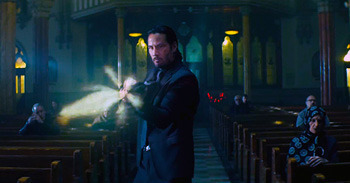
It's OK to shoot up a place if it is filled with bad people, right? Even if that place is a church ...
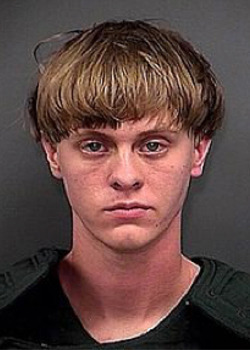
Oh, hi there. Remember this guy? I know there have been like 20 mass shootings since him, so it's hard to keep track, but this blank-eyed Nazi mushroom believed that black people were the bad guys, and reacted the way Hollywood has taught us to deal with bad guys by also shooting up a church to incite a reaction.
See what I'm getting at here? While none of these films directly caused gun violence, they certainly glorify everything we find unspeakable when done in the real world. To that crazy fuck with a gun, pop culture has declared that dressing in SWAT gear and dramatically shooting people we don't like is a heroic problem-solver. As a movie fanatic, I would never suggest that filmmakers like Tarantino stop making super-stylized shootout scenes. But it's hard to deny that when a culture makes guns readily available to almost everyone while also idolizing their reckless use in fiction, it's kind of stupid to wonder where this shit is coming from.
Say hello or challenge Dave to a violent tussle on Twitter.
Be sure to check out 5 Ways Movies Get Gunfights Wrong (Based On Experience) and 5 Ridiculous Gun Myths Everyone Believes (Thanks to Movies).
Subscribe to our YouTube channel, and check out 5 Gun Myths You Probably Believe (Thanks To Movies), and watch other videos you won't see on the site!